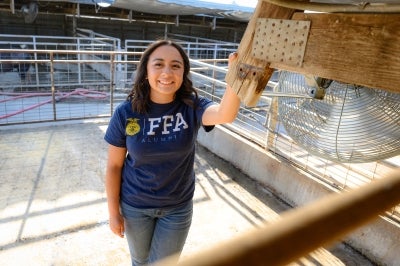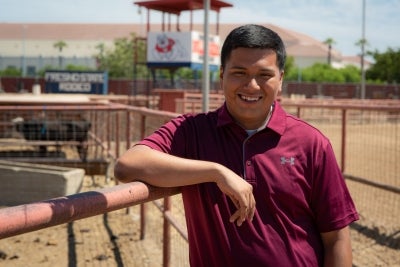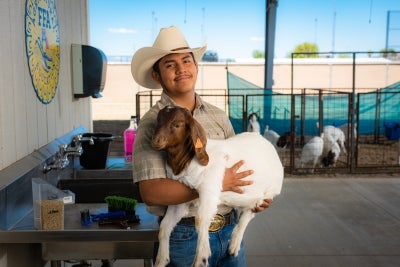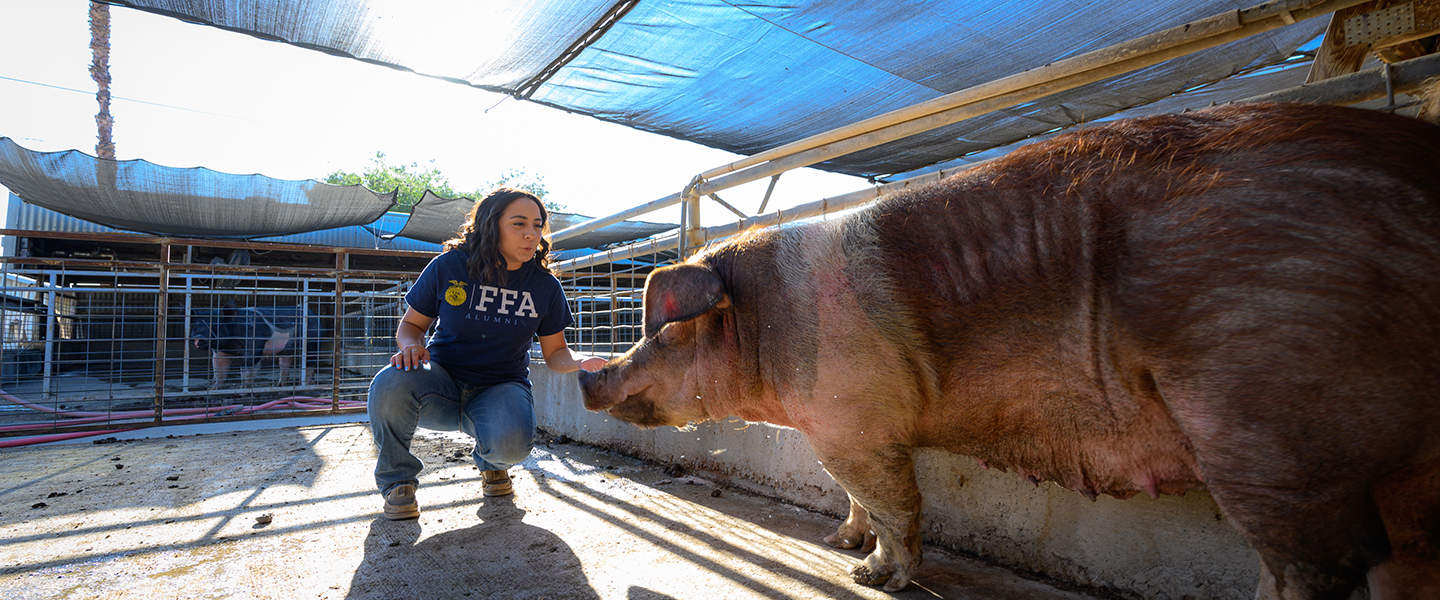“My grandparents worked in the fields in Mexico before immigrating to California, and I remember my grandpa on my dad’s side coming home from long days working in the vineyards. I grew up understanding that my grandparents made sacrifices so my parents could be born in the U.S., go to college and pursue their dreams here. Every day, I realize how lucky I am that I’m able to do the same.”
 Such is the story of Jocelyne Juarez, an alumna of the Wasco FFA in Wasco, Calif., and numerous other Latino-American FFA members and alumni who, inspired by family members who built careers in production agriculture, set out to make their mark.
Such is the story of Jocelyne Juarez, an alumna of the Wasco FFA in Wasco, Calif., and numerous other Latino-American FFA members and alumni who, inspired by family members who built careers in production agriculture, set out to make their mark.
In the process, they honor their rich heritage and their family legacies and prove that sometimes the apple doesn’t fall far from the tree.
Read on to learn how three Latino-Americans plan to pave their own paths in agriculture.
Paying It Forward
Juarez, who recently earned a bachelor’s degree in agricultural education with a specialization in animal science from California State University, Fresno (Fresno State), says she knew from a young age that she wanted to follow in her parents’ footsteps and become a teacher. It wasn’t until FFA that she decided to focus on agricultural education.
“I joined Wasco FFA as a freshman at the encouragement of my agricultural biology teacher,” says Juarez, a second-generation Latino- American who is now pursuing a master’s degree in agricultural sciences and a teaching credential at Fresno State. “Even though I came from an agricultural family, I really didn’t know what FFA was, but it didn’t take long for me to feel like I belonged.”
In addition to competing in public speaking events and raising livestock, Juarez served as the Wasco FFA vice president, the South Valley Section president and the San Joaquin Region vice president. Juarez also attended the 2018 National FFA Convention as a national delegate, and as an undergraduate student was part of an FFA Field Day planning committee and an on-campus multicultural ambassadors program.
“One of my biggest takeaways from FFA is the incredible impact advisors can have on their members,” Juarez says. “With the right leadership, an FFA chapter can become a family. That’s powerful, and it’s something I knew I wanted to be part of and help facilitate.”
She looks forward to building a career in a role that combines her deep-rooted appreciation for agriculture and education, and hopes to return to her alma mater to support the next generation of leaders in ag.
“I’d love to teach at Wasco High School and give back to the community that’s given me so many opportunities,” Juarez says. “I’m also passionate about helping young people who aren’t as fortunate as I’ve been. My family worked hard and sacrificed a lot to help me, and I want to pay it forward.”
Passion Meets Inspiration
 Ivan Trujillo, an alumnus of the Greenfield FFA in California, is currently a junior at Fresno State.
Ivan Trujillo, an alumnus of the Greenfield FFA in California, is currently a junior at Fresno State.
“I’ve been surrounded by agriculture my entire life, and I can’t imagine not working in the ag industry,” Trujillo says. “My grandparents farmed in Mexico for several years. To this day, my grandfather still has a cattle operation. My parents followed in their footsteps, working in agriculture when we moved to California. Even though I don’t plan to work in production agriculture, I can definitely trace my career choice back to my Latino upbringing.”
Trujillo, a first-generation Latino-American, says his background in agriculture made him a perfect fit for FFA, where he explored a wide range of opportunities. Along with serving in leadership roles in his chapter and participating in horticulture and floriculture events, he raised two heritage breeds of livestock, one of which was a 78-pound record-breaking goat at the 2019 Salinas Valley Fair.
“I wanted to experience as much as possible in FFA,” Trujillo says. “In the process, I was inspired by one of my agriculture teachers and I decided agricultural education was the path for me. I hope to inspire my future students in a similar way. Whether or not they choose to work in agriculture, I want to be a source of encouragement and show them they can do anything they put their minds to.”
Trujillo also notes he’s excited to represent his culture as an agriculture teacher and an FFA advisor while doing his part to ensure young people from all backgrounds and walks of life can find a home in FFA.
“My family didn’t understand why I’d want to be an agriculture teacher at first, but then I explained my vision and the difference I believe I can make,” says Trujillo, who remains active in FFA as a college student by serving as a conference facilitator for California FFA and an FFA ambassador at Fresno State. “They’re proud of me and they look forward to seeing what I accomplish in my career.”
Becoming Part of the Solution
 A junior at Mendota High School and a member of Mendota FFA in Mendota, Calif., Tomas Perez is no stranger to agriculture, and he plans to keep it that way.
A junior at Mendota High School and a member of Mendota FFA in Mendota, Calif., Tomas Perez is no stranger to agriculture, and he plans to keep it that way.
“Anything that has to do with agriculture excites me,” says Perez, a first-generation Latino-American. “I’ve worked in the fields since I was about 7 years old. My dad was a foreman on a farm and would take me to work on the weekends and during the summer. As I got older, he started to give me my own jobs to complete on the farm, and my responsibilities have continued to grow.”
Perez still spends summers, weekends, some afternoons and evenings
in the fields, giving him a unique perspective that he documents on his YouTube channel, “Trabajador Nato,” which translates to “Born Worker.”
“I record the jobs I do, like putting up fences or working with crops like tomatoes, almonds and pistachios, and I post them for others to see,” Perez says. “It allows me to be creative while also sharing something that many people might never see firsthand.”
Perez’s work has helped shape his career aspirations too. After college, he hopes to find a position where he can make improvements to the production side of agriculture, making jobs easier and less taxing for those in the fields.
“Anyone who works on a farm knows it can be very challenging,” Perez says. “It’s hard labor often done in extreme heat, sometimes exceeding 100 degrees, and the days are long. I want to make things better for people who have done this kind of work for many years and for those who will take over.”
Even though Perez stays busy on the farm and at school, currently enrolled in both high school and college courses, he continues to make time for FFA and plans to raise a goat to show and sell at his local county fair.
“I love FFA because there’s so much to learn, and it feels like there are endless opportunities to try new things,” Perez says. “I believe that many of the things I’m learning in FFA will help me in the future, especially combined with all I’ve learned while working in agriculture alongside my family.”












